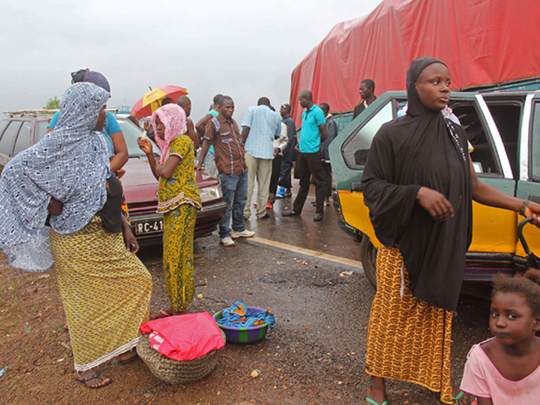
GENEVA: More than 20,000 people may be infected with the Ebola virus before the outbreak in West Africa is controlled and curbing the epidemic will cost at least $490 million (Dh1.8 billion), according to a World Health Organisation plan.
Those affected could be more than six times as many as doctors know about now, WHO said on Thursday.
A new plan to stop Ebola by the UN health agency also assumes that in many hard-hit areas, the actual number of cases may be two to four times higher than is currently reported.
The WHO’s cost estimate is up from $430 million in a draft of the road map reported by Bloomberg News this week.
The agency published new figures saying that 1,552 people have died from the killer virus from among the 3,069 cases reported so far in Liberia, Sierra Leone, Guinea and Nigeria. At least 40 per cent of the cases have been in just the last three weeks, the UN health agency said, adding that “the outbreak continues to accelerate.”
In Geneva, the agency also released a new plan for handling the Ebola crisis that aims to stop Ebola transmission in affected countries within six to nine months and prevent it from spreading internationally.
Dr. Bruce Aylward, WHO’s assistant director-general, told reporters the plan would cost $489 million over the next nine months and require the assistance of 750 international workers and 12,000 national workers.
The 20,000 figure, he added, “is a scale that I think has not ever been anticipated in terms of an Ebola outbreak.”
“That’s not saying we expect 20,000,” he added. “But we have got to have a system in place that we can deal with robust numbers.”
Aylward said the far-higher caseload is believed to come from cities.
“It’s really just some urban areas that have outstripped the reporting capacity,” he said.
Aylward also said the agency is urging airlines to lift most of their restrictions about flying to Ebola-hit nations because a predictable “air link” is needed to help deal with the crisis. Air France on Wednesday cancelled its flights to Sierra Leone. Aylward said the agency hopes airlines will lift most restrictions within two weeks.
Nigeria meanwhile announced the virus had reached its oil-producing hub, dashing hopes that the country had successfully contained its spread outside its biggest city, Lagos.
Nigerian authorities said a man who contracted Ebola after coming into contact with a traveller from Liberia had evaded their surveillance efforts and infected a doctor in southern Nigeria who later died.
The announcement of a sixth death in Nigeria marked the first fatality outside the commercial capital of Lagos, where a Liberian-American man Patrick Sawyer arrived in late July and later died of Ebola. On Wednesday, Nigerian authorities had said they not yet eliminated the disease from Africa’s most populous nation but that it was being contained.
The developments came after the director of the US Centers for Disease Control and Prevention, Tom Frieden, said on Wednesday there was no quick fix to what the WHO has called an “unprecedented” outbreak and called for “urgent action”.
Frieden told a news conference in the Liberian capital, Monrovia: “The cases are increasing. I wish I did not have to say this but it is going to get worse before it gets better.”
There has been mounting concern about the effect of the most lethal outbreak of the tropical virus in history, which the WHO said on Thursday could cost at least $490 million to tackle over six months.












